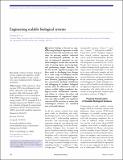Engineering scalable biological systems
Author(s)
Lu, Timothy K.
DownloadLu-Engineering scalable.pdf (1.126Mb)
PUBLISHER_CC
Publisher with Creative Commons License
Creative Commons Attribution
Terms of use
Metadata
Show full item recordAbstract
Synthetic biology is focused on engineering biological organisms to study natural systems and to provide new solutions for pressing medical, industrial, and environmental problems. At the core of engineered organisms are synthetic biological circuits that execute the tasks of sensing inputs, processing logic, and performing output functions. In the last decade, significant progress has been made in developing basic designs for a wide range of biological circuits in bacteria, yeast, and mammalian systems. However, significant challenges in the construction, probing, modulation, and debugging of synthetic biological systems must be addressed in order to achieve scalable higher-complexity biological circuits. Furthermore, concomitant efforts to evaluate the safety and biocontainment of engineered organisms and address public and regulatory concerns will be necessary to ensure that technological advances are translated into real-world solutions.
Date issued
2010-11Department
Massachusetts Institute of Technology. Department of Electrical Engineering and Computer Science; Massachusetts Institute of Technology. Research Laboratory of ElectronicsJournal
Bioengineered Bugs
Publisher
Landes Bioscience
Citation
Lu, Timothy K. “Engineering Scalable Biological Systems.” Bioengineered Bugs 1.6 (2010): 378–384. © 2010 Landes Bioscience
Version: Final published version
ISSN
1949-1018